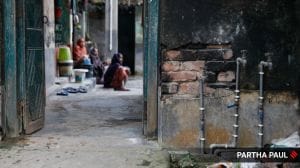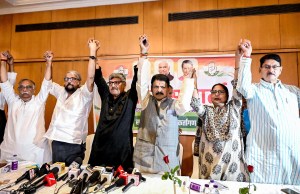Wall breached, minds unbridged
For all its symbolic potential, the new road in this village near Ezhumalai in Madurai has failed to bridge the caste-riven society.

For all its symbolic potential, the new road in this village near Ezhumalai in Madurai has failed to bridge the caste-riven society. Restored two days ago after demolishing the wall that had separated two castes for decades, the road is not being used by the people it was meant for, the Dalits. Fear of an upper caste Pillaiyar backlash has kept the nearly 200 Dalit families in the area from using it to reach the main thoroughfare—a phantom limb that is a painful reminder of the mindset that has existed for years.
“Nothing much has changed on the ground. At present, there are hundreds of police personnel here, but what happens when they are deployed elsewhere and the upper caste members return? We are afraid they will kill us if we take the road,” said Masanam, a Dalit mason who works in neighbouring states to earn a living.
The fear for his life and his family’s safety have also kept 28-year-old Mani, another mason, from using the easier route instead of the old, circuitous one. So it has only been the police personnel who have travelled the road since it was constructed.
Ironically, more than the wall, it is the manner in which the Dalits are treated while approaching the main road that has been the problem all along. “For years, we have been made to wait inside our colony, far away from the bus stop. A bus shelter was constructed, but it was demolished by the Pillaiyars because they didn’t want to see us sitting there when they crossed the area,” said Nagarajan, a schoolteacher from the Dalit community.
So ever since the bus service began, the Dalits have been forced to stand, wait at a distance and run to catch the bus at the last minute. “When my wife was pregnant, we had to wait in this designated area and walk towards the bus only after it stopped. Even aged people were not spared,” said Masanam.
“The panchayat president, a Dalit, had constructed a low parapet to sit while waiting for the bus, but the Pillaiyars did not permit us to do even that,” said Chellandy, an elderly resident.
Building a bus shelter would seem a simple enough task, but it has posed a dilemma for the district administration.
The shelter is close to the temple of Muthalamman for the Pillaiyars, where the lower castes are not allowed. The Pillaiyars, who locked up their houses and left the area with their children and cattle, have demanded title deeds for the government land in the community’s name.
Within the temple premises is a peepal tree regarded by the Dalits as god Mariamman. The trigger for the flare-up between the communities has been this tree as the Pillaiyars have prevented the Dalits from offering prayers during the annual festival in April. “When we visited the place during the Tamil month of Pankuni, they threatened to kill us if we carried out a procession through the area. The tree was planted by us only to be appropriated by the upper caste,” said a local resident.
With the issue now raring up on the same land, the district administration has an unenviable task of finding a middle path. The situation has aggravated over the years because the Dalits, who have been engaged in masonry, construction work and as agricultural labourers, have become educated, and hence, more aware.
“The problem has existed for the past several years though it was never deteriorated to the current level. Now, the educated youngsters are questioning the very mindset behind the construction and maintenance of the wall,” said Karuppaiah. The youth despise the way they are treated like “animals to be confined within a safety wall”, said another youth. The generation gap that education and awareness accentuated made people like school teacher Nagendran oppose the existence of the wall that has been accepted as a landmark by people like Karuppaiah.
“Without education, we didn’t even know the way our panchayat functioned let alone the progresses made across the world,” said Masanam, asserting that he would educate his two children.
Perhaps, that will be the beginning of the end to the problem that seems to be heading nowhere—road or not.



- 01
- 02
- 03
- 04
- 05




























